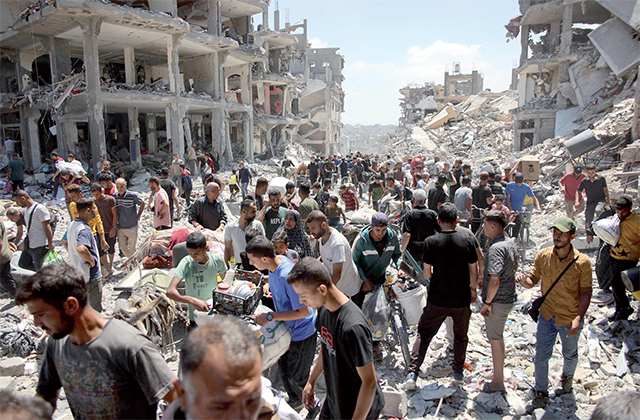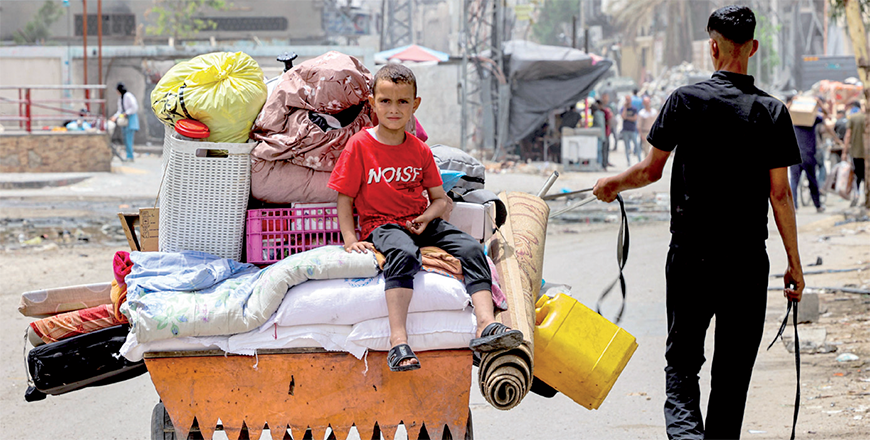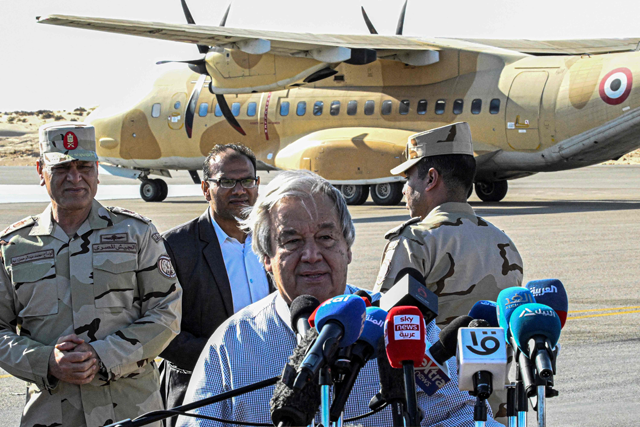You are here
Rafah battles intensify as Israel takes over Gaza-Egypt border strip
By AFP - May 31,2024 - Last updated at May 31,2024

Palestinians carry some salvaged belongings as they leave the Jabalia refugee camp in the northern Gaza Strip after they returned briefly to check on their homes on Thursday (AFP photo)
RAFAH, Palestinian Territories — Rafah residents reported intense artillery shelling and gunfire on Thursday in Gaza's far-southern city after Israel said it had seized a strategic corridor on the Palestinian territory's border with Egypt.
The Israeli forces launched its incursion into Rafah in early May despite international objections over the fate of Palestinian civilians sheltering there.
A strike over the weekend that started a fire and killed dozens in a displacement camp drew a wave of fresh condemnation, including a social media campaign with the slogan "All eyes on Rafah" that has been shared by tens of millions of users.
Israel, which has repeatedly vowed to destroy Hamas after the Palestinian fighters attacked southern Israel on October 7, said on Wednesday its forces had taken over the 14-kilometre Philadelphi corridor on the Gaza-Egypt border, which it suspects was used for weapons smuggling.
Military spokesman Rear Admiral Daniel Hagari announced Israel had taken "operational control" of the narrow border area, where he said troops had "discovered around 20 tunnels".
Egypt, a longtime mediator in the conflict which has become increasingly vocal in its criticism of the Israeli operation, has rejected claims of smuggling tunnels running beneath the buffer zone.
"Israel is using these allegations to justify continuing the operation on the Palestinian city of Rafah and prolonging the war for political purposes," a high-level Egyptian source was quoted as saying by state-linked Al Qahera News.
On the ground in the Gaza Strip, witnesses reported fighting in central and western Rafah.
Witnesses also said Israeli forces had demolished several buildings in the city’s eastern areas where the Israeli incursion began on May 7, initially focusing on the vital Rafah border crossing, a key entry point for humanitarian aid.
UN draft resolution
An AFP correspondent reported artillery and gunfire in Gaza City’s southern neighbourhood of Zeitun, in the territory’s north, where witnesses saw thick plumes of smoke rising over Jabalia refugee camp and Beit Lahia.
A steady stream of civilians have fled Rafah, transporting their belongings on their shoulders, in cars or on donkey-drawn carts.
Before the Rafah offensive began, the United Nations said up to 1.4 million people were sheltering there. Since then, 1 million have fled the area, the UN agency for Palestinian refugees, UNRWA, has said.
The Palestinian Red Crescent reported late Wednesday that two of its paramedics “were killed as a result of the Israeli occupation’s direct bombing” of an ambulance near Rafah.
The weekend Israeli strike and ensuing fire which tore through the camp for displaced Palestinians in Rafah, killed 45 people, according to Gaza officials and has prompted two days of discussions at the UN Security Council.
Israel has said it targeted a Hamas compound and killed two senior members.
In the wake of the strike, Algeria presented a draft UN resolution that “demands an immediate ceasefire respected by all parties” and the release of all hostages, but it was not clear when it would be put to a vote.
In a phone call with Palestinian president Mahmud Abbas on Wednesday, France’s Emmanuel Macron said Paris was “determined to work with Algeria” to ensure the council “makes a strong statement on Rafah”.
He also called on Abbas to “implement necessary reforms”, offering the “prospect of recognition of the state of Palestine”.
Decisions by Spain, Norway and Ireland to formally recognise the State of Palestine this week have sparked a debate over the issue, and Macron said it should take place at a “useful moment”.
Related Articles
RAFAH, Palestinian Territories — Israel struck Gaza on Sunday and troops were battling militants in several areas of the Hamas-run territory
RAFAH, Palestinian Territories — Heavy clashes and bombardment rocked the southern Gaza city of Rafah on Saturday, as the United Nations sai
RAFAH, Egypt — UN Secretary-General Antonio Guterres, on a visit to the doorstep of war-ravaged Gaza, on Saturday said the world has s














